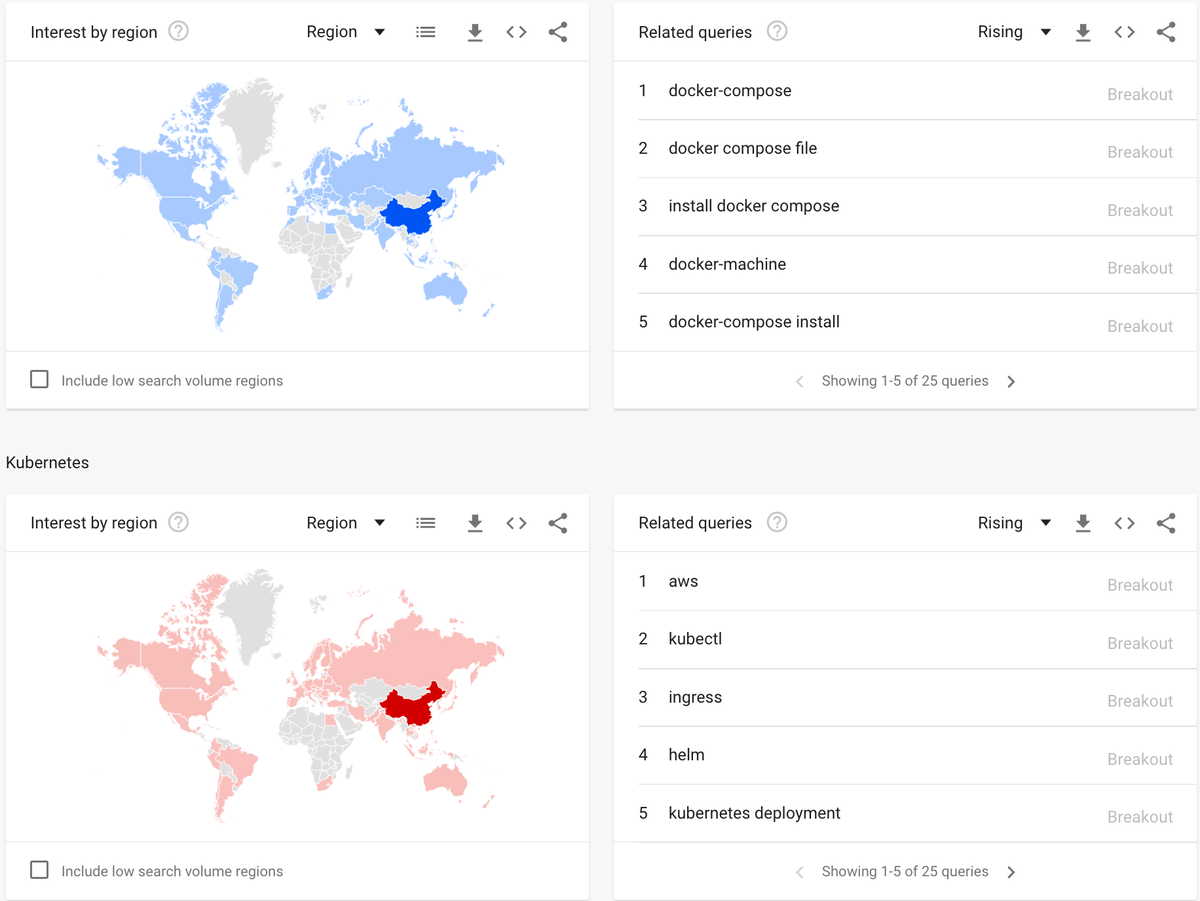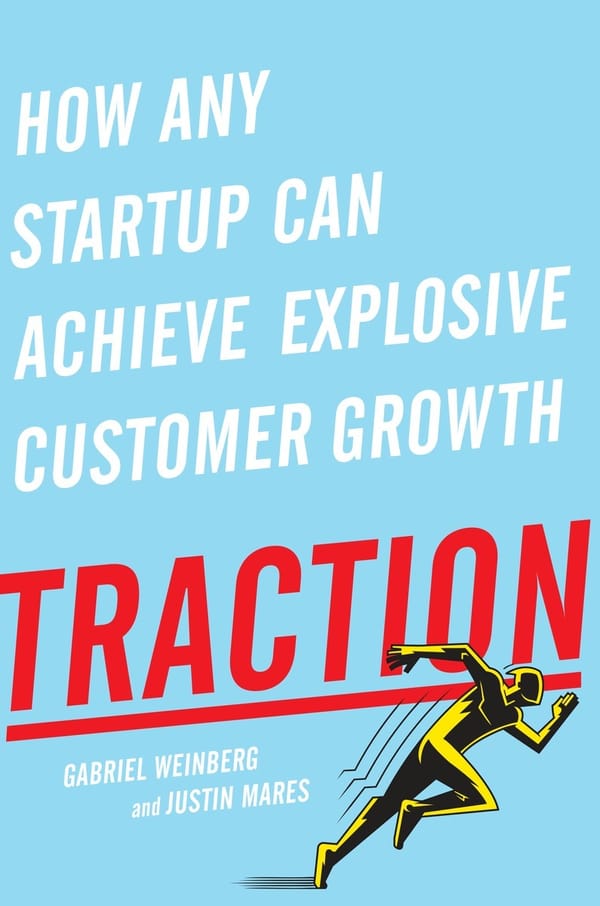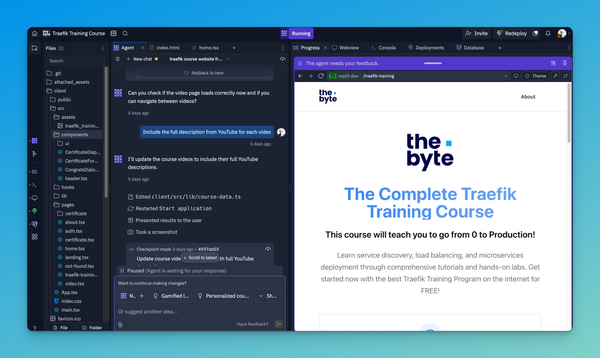Analyzing VMWare, Docker, and Kubernetes Trends
Explore the latest trends in VMware, Docker, and Kubernetes and how they are shaping modern IT infrastructure. Learn about their differences, how they complement each other, and why Kubernetes is key for large-scale container orchestration.

Containers, Microservices, Serverless, Cloud, and DevOps are terms we read and hear about daily. Entire foundations and ecosystems have been built around Cloud Native. Do you remember a time before Cloud Native and containers?
Pre-2013, we were living in a Monolithic world.
Yes, we had things like Service-Oriented Architecture (SOA), a precursor to Microservices, but we still had the same challenges about gluing services and technologies together, which was a very painful experience.
Relying only on Google Trends is not an entirely accurate look at our ecosystem but the trend timelines and search queries are quite interesting. Also, what other open-source reliable data can we count since everything else has a blog, sponsor, or Gartner affiliation?
Let's take a look at the trends for VMWare, Kubernetes, and Docker. I started with VMWare as the technology launched us toward containers and application isolation while sharing hosts.
How do we use Google Trends
Before we examine the various trends, let’s examine how Google Trends computes the data. Google Trends shows how frequently search terms are entered into Google Search. The search trends are then gauged on popularity over the time of the query. Data is available as far back as 2004, normalized, and cleaned to provide as accurate a look as possible into the data.
VMware Trends
VMware honestly was revolutionary. I remember first seeing a demo of VMware in 2001 which blew me away and catapulted me in the direction of running everything in a VM. Fast forward to 2013/2014.
Docker started rising in popularity and VMware was top of their game. VMware helped lay the foundation for many people to easily move from VM’s to containers as we already understood the value of isolating operating systems with VM’s and now applications using containers.
According to Google Trends, five years ago, in 2014, VMware hit peak interest. That means VMware, the term, and supporting terms were the most popular at this time. Interest since 2014, according to Google, has gone down and to the right until….VMware acquired PKS, and now the trend line seems to have stabilized.
Now, this is reading a lot between the lines, but it does match the timelines quite well, and we see a couple. It's not exactly science, ticks in the trend around the time of the announcements. Not exact science but you get what you pay for.
My first reaction looking at this chart was “Oh no, VMware must be in trouble”. Quite the contrary. The Google Trend interest does not correlate with the VMware stock price (VMW)or profit as a company. The company is doing very well, and the stock price is almost opposite of the trend line for the same period.
So why would we see VMWare lose interest over time? I believe it is related to their products, which have already saturated the enterprise, medium, and small business markets and have long life cycles. The product is stable, and the real trends will come from new products like PKS or AWS connectors rather than existing workloads.
Docker Trends
Six years ago, Docker was launched as a product. Docker has changed how we work and built an entirely new ecosystem that didn’t exist before 2013. It is incredible to think how far we have come in such a short time.
You would think that after 6 years, we would see a similar trend line as VMware. That is absolutely not the case. Google Trends is measuring present as the peak interest of Docker, which means we have yet to see peak Docker popularity.
New users are still discovering Docker as seen by a recent tweet from Docker Captain Julie Lerman and her remote presentation to Concatenate Conference in Africa.
If you take a look at the Top Queries people are still Googling the basic Docker commands like container, install, run, and image. One search query that stood out for me in Rising Queries is Docker TensorFlow jammed between all the basic Docker commands.
Top Docker Queries
Kubernetes Trends
It is almost impossible today to mention Docker without following up with Kubernetes. Kubernetes started off in 2014 with a bang being released by Google and gaining instant popularity and traction.
Kubernetes has become so popular that it now has one of the most popular conferences in open source, KubeCon, and an incredibly large community. With every vendor scrambling to take part of the Kubernetes gold rush we are seeing new Kubernetes distributions what seems like weekly.
However, if anyone remembers these days it was extremely painful to get up and running. Now all major Public Cloud providers offer a Managed Kubernetes and thankfully these hard times are behind us.
Kubernetes is also running at Peak Interest, and we are still in uncharted territories like Docker about pushing peak interest forward.
What stands out is the Rising Related queries. A huge increase in popularity for slimmed down versions of Kubernetes like K3S and MicroK8s. I’m also seeing a rising interest from our customers to explore these slimmed down versions of Kubernetes. For small workloads, development, or Internet of Things this a great advancement. Amazon AWS is also the most searched Cloud related to Kubernetes.
Top Kubernetes Queries
Comparing Docker and Kubernetes Trends
Next, we compare Docker and Kubernetes trends. This may surprise many, but Docker as a search term is still more popular than Kubernetes. OK, OK, down in the back, and let me explain.
Not everyone needs to run Kubernetes. I know many people will argue this point but back to the Docker Trend we still see many people learning the basics of Docker and probably running containers locally or with docker-compose.
This doesn’t mean one is better than the other. What it means is that the ecosystem is still growing. Believe it or not, developers are still discovering Docker only now, which will most likely mean these new users will eventually become Kubernetes users, further pushing the peak interest even further forward.
Where do we go from here?
Now, according to Google Trends, Docker is more popular than Kubernetes. However, as mentioned, this is in no way an indication of what businesses are doing or the industry as a whole. These Trends only highlight what people are searching for. Docker and Kubernetes are still growing.
Exploring the trends over time the Trend has moved from different geographies around the world spiking in popularity at different times. We are still in frothing bubble phase and will continue moving forward for the forseeable future.
Will Docker and Kubernetes be around in Five years? I belive so yes. If you ask Cloud Economist (What the hell is that?) Corey Quinn, predicts Kubernetes won't be around much longer in his latest interview.
Time will tell but for now keep learning DevOps and Container technologies until the next technology wave arrives.
FAQ Section: Analyzing VMware, Docker, and Kubernetes Trends
What are the key differences between VMware, Docker, and Kubernetes?
VMware, Docker, and Kubernetes are all tools used in virtualization and containerization, but they serve different purposes. VMware is primarily focused on virtual machines (VMs), providing a platform to run multiple operating systems on a single physical server. Docker is a containerization platform that packages applications and their dependencies into containers, enabling consistent environments across development and production. Kubernetes is an orchestration platform that manages and scales containerized applications across clusters of servers. While VMware focuses on VMs, Docker and Kubernetes are centered around containerization and orchestration.
How are trends in VMware, Docker, and Kubernetes shaping modern IT infrastructure?
Trends in VMware, Docker, and Kubernetes are significantly shaping modern IT infrastructure by driving a shift towards containerization and microservices. VMware remains essential for traditional VM-based workloads but is increasingly integrating with containers through solutions like VMware Tanzu. Docker has revolutionized how applications are developed and deployed by enabling lightweight, portable containers. Kubernetes has emerged as the de facto standard for container orchestration, providing powerful tools for managing large-scale, distributed applications. Together, these technologies enable more flexible, scalable, and efficient infrastructure management.
Why is Kubernetes often chosen over Docker alone for large-scale applications?
Kubernetes is often chosen over Docker alone for large-scale applications because it provides advanced orchestration features that Docker does not offer by itself. While Docker is excellent for building and running containers, Kubernetes adds capabilities like automated scaling, load balancing, self-healing (restarting failed containers), and rolling updates. These features make Kubernetes better suited for managing complex, distributed systems where high availability, scalability, and automation are critical.
What is the role of VMware in the containerization and Kubernetes ecosystem?
VMware plays a significant role in the containerization and Kubernetes ecosystem by providing integration solutions that bridge the gap between traditional VM-based infrastructures and modern containerized environments. VMware's Tanzu portfolio, for example, allows organizations to run Kubernetes on top of VMware infrastructure, enabling them to leverage their existing VMware investments while adopting containerization and Kubernetes for new applications. This integration helps organizations transition to cloud-native architectures without completely overhauling their current systems.
How are organizations using VMware, Docker, and Kubernetes together?
Organizations use VMware, Docker, and Kubernetes together to create a hybrid infrastructure that supports both legacy and cloud-native applications. For example, VMware can host VMs for traditional applications while also running Kubernetes clusters for containerized workloads. Docker is used to package applications into containers, which are then managed and orchestrated by Kubernetes. This combination allows organizations to optimize resource usage, improve application deployment and management processes, and gradually transition to a more agile, container-based architecture.
Follow me
If you liked this article, Follow Me on Twitter to stay updated!



